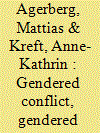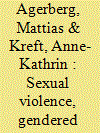| Srl | Item |
| 1 |
ID:
173772


|
|
|
|
|
| Summary/Abstract |
Sexual violence (SV) in conflict is increasingly politicized at both the international and domestic levels. Where SV in conflict is prevalent, we argue international actors perceive gender to be salient and push for a gendered response. Simultaneously, women mobilize politically in response to the threat to their security that conflict-related SV constitutes, making demands for greater representation in politics with the goal of improving societal conditions for themselves. Jointly, we theorize the pressures from above and below push governments in conflict-affected states toward adopting gender policies. We test this theoretical framework in the case of gender quota adoption. We find that states with prevalent wartime SV indeed adopt gender quotas sooner and at higher rates than states experiencing other civil conflicts and than states experiencing no conflict in the same period. These gender quotas, we further show, are not mere window dressing but actually increase women’s legislative representation.
|
|
|
|
|
|
|
|
|
|
|
|
|
|
|
|
| 2 |
ID:
192878


|
|
|
|
|
| Summary/Abstract |
The protection of civilians from human rights violations has increasingly become a global priority. The wars in Bosnia and Rwanda in the 1990s, and the development of the Women, Peace and Security framework have placed conflict-related sexual violence on the global protection agenda. Prior research has found that international attention to, and intervention in, conflicts is in fact more likely when there are reports of widespread sexual violence, regardless of overall conflict intensity. This article theorizes and empirically examines the micro-level underpinnings of these patterns. We hypothesize that individuals are more likely to support military intervention in conflicts with prevalent sexual violence as opposed to other types of conflict violence. The reason lies in gendered protection norms, based in benevolent sexism, that continue to have traction also in Western societies. In equivalent survey experiments carried out in the United States, the United Kingdom and Sweden, we find that support for international intervention is highest in sexual violence conflicts. In the United States and the United Kingdom, the responsibility to protect and gendered perceptions of victimhood mediate this effect. A follow-up experiment in the United States provides further evidence of a gendered protection norm as a core mechanism driving our results.
|
|
|
|
|
|
|
|
|
|
|
|
|
|
|
|